To Clyburn, Haley’s Age Isn’t the Problem
Homepage photo: Don Lemon on air in his much-discussed outfit. (Credit: CNN)
Support Journal-ismsDonations are tax-deductible.

To Clyburn, Haley’s Age Isn’t the Problem
“Don Lemon, a co-host of ‘CNN This Morning,’ is still off the air, four days after apologizing on Twitter and internally for describing Nikki Haley on the show last Thursday as ‘past her prime,’ “ Vanessa Friedman wrote Monday for The New York Times. “His comment, while discussing her presidential bid, seemed to refer implicitly to the Republican candidate’s appearance and age in a derogatory and retrograde way, setting off a public firestorm that is still reverberating.
Separately, Rep. James Clyburn, D-S.C., the House assistant Democratic leader, who is 82, took a swipe at Haley, his fellow South Carolinian, Sunday at the Journal-isms Roundtable (video, 52:51). It was not because of her age, but her indulgence of questionable characters, including the “racist” who introduced Haley at her campaign announcement.
Friedman continued, “Mr. Lemon, of all people, should have known better.
“After all, Mr. Lemon has himself experienced criticism because of his appearance and pushed back, vocally, less than a month before his dismissal of Ms. Haley. It was only in late January that he went on something of a spiel saying he understood what it was like to be a woman and be judged on appearances, because the same thing had happened to him.
“The occasion, back then, was his decision to wear a hoodie with a suit jacket while on the air, which proved such an unexpected sartorial choice for an anchorman that it went viral, creating its own mini-news cycle. Stephen Colbert called out the look, saying he always watched the CNN show but was ‘a little taken aback’ because of what Mr. Lemon was wearing.
“ ‘I know they want to add some comedy to CNN, and this is hilarious,’ Mr. Colbert said. ‘How do you report the news in that outfit? How do you talk about tragedy wearing that? Because what could be more tragic than that look?’
“Mr. Colbert, who generally wears a suit and tie on-air, described Mr. Lemon’s look as ‘a high school track teacher who went for a run,’ then stopped at a nice restaurant and was told he had to wear a jacket, so he ‘stole a jacket from an extra from ‘ “Guys and Dolls.” ‘
“Mr. Lemon responded in turn on his show, though unlike Mr. Colbert, he did not seem to find anything funny in the subject. . . . ” though he said he was a fan of Colbert and added that views on acceptable attire are changing.
Speculation continues about Lemon’s future on “CNN This Morning,” as network spokesman Matt Dornic told the New York Post that Lemon had been scheduled to be back in the anchor chair Monday but opted to take off for Presidents’ Day.
“I thought he was coming back tomorrow but he is taking the holiday,” Dornic said in an email to the newspaper.
However, the Daily Mail reported Monday, “When asked if it was true that Don Lemon is being inched towards the exit door in the wake of this latest scandal, another spokesperson for CNN told DailyMail.com, ‘it is patently false to say Don is being pushed to resign’.“
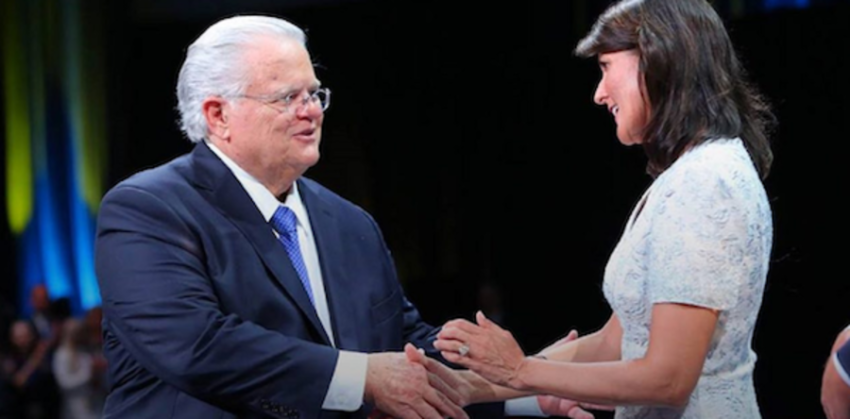
Meanwhile, Clyburn was asked at the Journal-isms Roundtable Sunday about Haley and her fellow South Carolina Republican, Sen. Tim Scott, who is said to be weighing a presidential race.
Clyburn (pictured below at Sunday’s Journal-isms Roundtable, by Sharon Farmer) said he had not yet heard from Scott, but that “All you need to know about Nikki Haley’s candidacy are these two things:
“Number One. When she made her announcement in person, she had the invocation given by a gentleman
who is a preacher, Reverend Hagee. I want y’all to look him up.
“John Hagee. H-A-G-E-E.
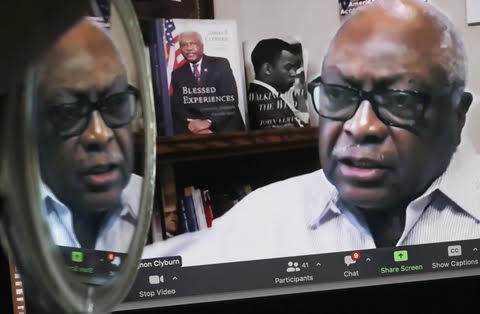 “John Hagee gave me the invocation. This is the man who talked about Ebola being God’s wrath upon us. This is the man who blamed Barack Obama . . . saying . . . the big problem with Katrina is because Barack Obama wanted to divide Jerusalem,” [though George W. Bush was president during that catastrophic hurricane]. . . . This guy is so racist, so when he endorsed John McCain, John McCain refused the endorsement.
“John Hagee gave me the invocation. This is the man who talked about Ebola being God’s wrath upon us. This is the man who blamed Barack Obama . . . saying . . . the big problem with Katrina is because Barack Obama wanted to divide Jerusalem,” [though George W. Bush was president during that catastrophic hurricane]. . . . This guy is so racist, so when he endorsed John McCain, John McCain refused the endorsement.
“He gave the prayer for Nikki Haley, and Nikki Haley went to the mic, she looked over at him, thanked him for being there, and says, ‘I want to be just like you when I grow up.’ . . .
“And that’s not to get to the fact that Ralph Norman, the congressman from South Carolina, brought her up. . . . He was the one, by misspelling martial law, he spelled it like the name Marshall, and asked that the president invoke ‘Marshall Law’ to keep Joe Biden from becoming president of the United States. That’s who brought her up.
“Those are the only two things you need to know about Nikki Haley, if you have a problem doing research.”
- Wajahat Ali, MSNBC: Nikki Haley’s ‘model minority’ trope isn’t surprising. But it’s still dangerous
- Sue Halpern, New Yorker: Why Is Nikki Haley Running for President?
- Hanna Panreck, Fox News: Whoopi Goldberg echoes Don Lemon in attacking Nikki Haley: ‘You’re not a new generation, you’re 51’.
Black Journalists Will Figure in Carter’s Legacy
February 19, 2023
Loss to Reagan Was to Some a Bad Dream
Clyburn Lauds Carter on Judgeships, Showing ‘How to Lose’
Support Journal-ismsDonations are tax-deductible.
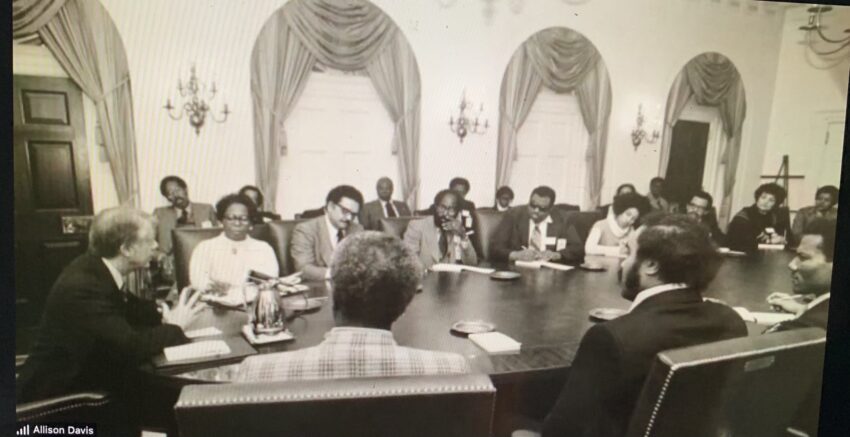
Loss to Reagan Was to Some a Bad Dream
When Jimmy Carter sat down with 29 Black media representatives at the White House on Feb. 16, 1978, he admitted that at his news conferences, the only Black reporter he remembered by name was Ed Bradley of CBS.
“At press conferences, I don’t know many of the names of the reporters who serve on the White House press pool,” Carter said. “I know we had a reception for them Christmas; we had, I think, 1,400 people who came. There are hundreds of them. And I try to do the best I can to spread the questions around. But one Black reporter that I call on every now and then is Ed Bradley with CBS. And I try to spread my questions around.”
“We’ll give you the names of our Black-owned newspapers,” came one response. Ed Bradley is with CBS.”
“Yes, I know,” Carter replied.
“We are desirous, however, [that] our Black-oriented publications have an opportunity to ask our President a question,” came the response.
“I think that’s a good idea,” Carter said.
The National Association of Black Journalists, which had 12 board members at the meeting, was not yet three years old. The session with Carter and his Cabinet “legitimized the organization to media executives,” NABJ would later say. The National Association of Black Owned Broadcasters and the National Newspaper Publishers Association, which advocates for Black-press publishers, were also represented.
Carter, at 98 the oldest living former president, has chosen to spend his final days at home in Plains, Ga., in hospice care after a series of brief hospital stays, the Carter Center announced Saturday.
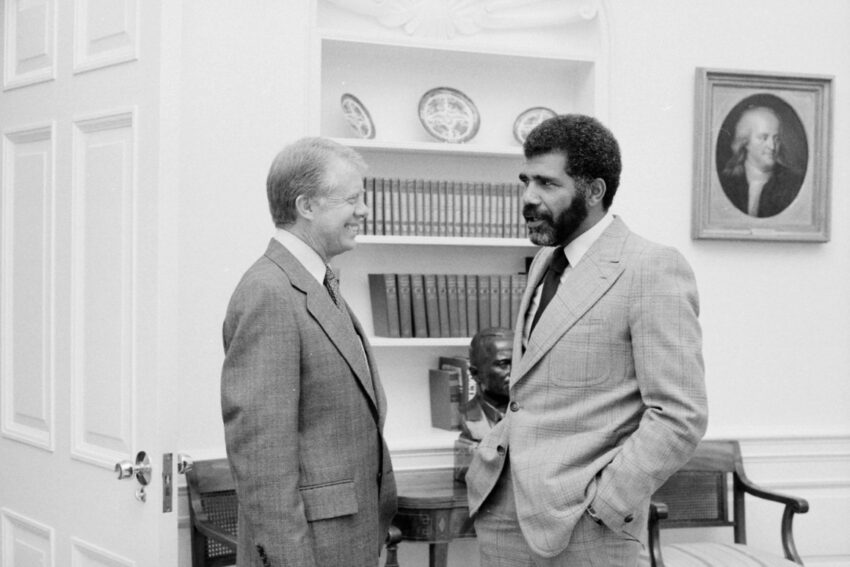
Carter beat Republican incumbent Gerald R. Ford in the 1976 presidential election, thanks to the Black vote. “The Washington Post reported that as much as 96 percent of the national black population voted for Carter, and a study conducted by the Joint Center for Political Studies in Washington, D.C. backed those findings,” recounted Marva L. Washington, who wrote a thesis on the 1976 campaign for California State University – Northridge.
But the Black press was not always in Carter’s corner. Robert S. Allison, editor of the Los Angeles Herald-Dispatch, asserted during the campaign that Carter was created and being “sold” to Blacks by the white media, Washington wrote.
During that contest, NABJ was angry that it had been snubbed. The organization invited both Ford and Carter to its first annual convention, held at Texas Southern University in Houston, but both declined, citing scheduling conflicts. However, at the last minute, Carter invited a small group of Black journalists to meet privately with him for 45 minutes in Chevy Chase, Md., Wayne Dawkins wrote in 1993’s “Black Journalists: The NABJ Story.”
 “For Carter to schedule such a meeting on the same day as the first significant black journalist conference in another city is a typical divisive tactic that caused some of the cataclysms we are witnessing in South Africa,” responded NABJ, then led by outspoken Chicago columnist Vernon Jarrett (pictured).
“For Carter to schedule such a meeting on the same day as the first significant black journalist conference in another city is a typical divisive tactic that caused some of the cataclysms we are witnessing in South Africa,” responded NABJ, then led by outspoken Chicago columnist Vernon Jarrett (pictured).
Still, some in Black media were impressed with Carter, such as John H. Johnson, publisher of Ebony and Jet magazines. In his 1989 autobiography, “Succeeding Against the Odds,” written with Lerone Bennett Jr., Johnson writes that he convened, at Carter’s request, an early-morning editorial board meeting.
“Carter walked in cold on that morning and captivated us. The first thing he said to me was, ‘Mr. Johnson, I’m glad to meet you. We’re both Morehouse Men.’ He was technically correct, for both of us had received honorary degrees from the predominantly Black college that produced Martin Luther King, Jr.
“More importantly, he was politically correct in stressing his identification with a tradition and a dream. I knew then that the peanut farmer from Plains, Georgia, was going far, and I was not surprised when he walked away with all the marbles.”
When Carter lost re-election in 1980 to Ronald Reagan, there was no disguising Black America’s sense of loss.
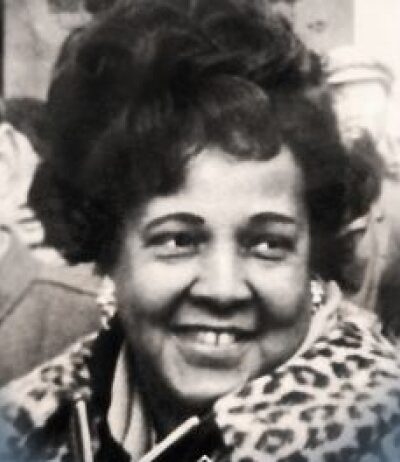 “Along towards midnight of November 4,” wrote the venerated Black journalist Ethel Payne (pictured), “the emotional reaction among blacks across the country to the landslide victory of Ronald Reagan came close to a massive breakdown,” she said, according to James McGrath Morris in his 2015 biography of Payne, “Eye on the Struggle: Ethel Payne, the First Lady of the Black Press.”
“Along towards midnight of November 4,” wrote the venerated Black journalist Ethel Payne (pictured), “the emotional reaction among blacks across the country to the landslide victory of Ronald Reagan came close to a massive breakdown,” she said, according to James McGrath Morris in his 2015 biography of Payne, “Eye on the Struggle: Ethel Payne, the First Lady of the Black Press.”
“In her own case, the election caused her to wake up in the middle of the night from a dream in which the Ku Klux Klan, the Moral Majority, and the Christian Voice — the latter two being conservative groups that triumphed in 1980 — were conducting a purge of undesirable blacks.”
While Carter made news in the mainstream press at that 1978 meeting with comments about conflict between Ethiopia and Somalia, then in the news, the African Americans around the table also asked about Black progress in the American media.
“Our administration over this past year has been very concerned about the difficulty of Black citizens and other minority groups in trying to acquire ownership of the electronic media,” Carter said in response to a question about the continuing deficit in ownership by people of color.
“And on behalf of the minority citizens of our country, we have now filed a petition directly with the Federal Communications Commission, as you know, and I have sent a message to Congress –and [deputy press secretary] Walt Wurfel or somebody can get you a copy of it -— expressing to Congress the need to ensure that in the future Black citizens and Black citizens’ groups can acquire ownership and control of the electronic media, both television and radio.”
And in a pledge echoed just last week in an executive order from President Biden, Carter said, “we have passed our goal of having $100 million in Federal money deposited in minority-owned banks, and we will meet our goal of more than 10 percent of the local public works projects being devoted or assigned to minority businesses for completion. I’ve instructed all executive agencies in the Federal Government to double in this and the next fiscal year the amount of purchases of equipment and supplies from Black or minority-owned businesses.”
The National Newspaper Publishers Association and the National Association of Hispanic Publications, along with others, have long pressed for advertising spending by government agencies in media owned by people of color.
Carter also met with Black journalists in January 1979, when, W. Dale Nelson wrote for the Associated Press, Carter declared that “Persons nominated to be federal judges will be asked whether they belong to clubs that exclude blacks or women if the Senate Judiciary Committee adopts a questionnaire it is considering,” according to Nelson’s story.
While some might consider covering the White House a dream assignment, it wasn’t seen that way by every journalist.
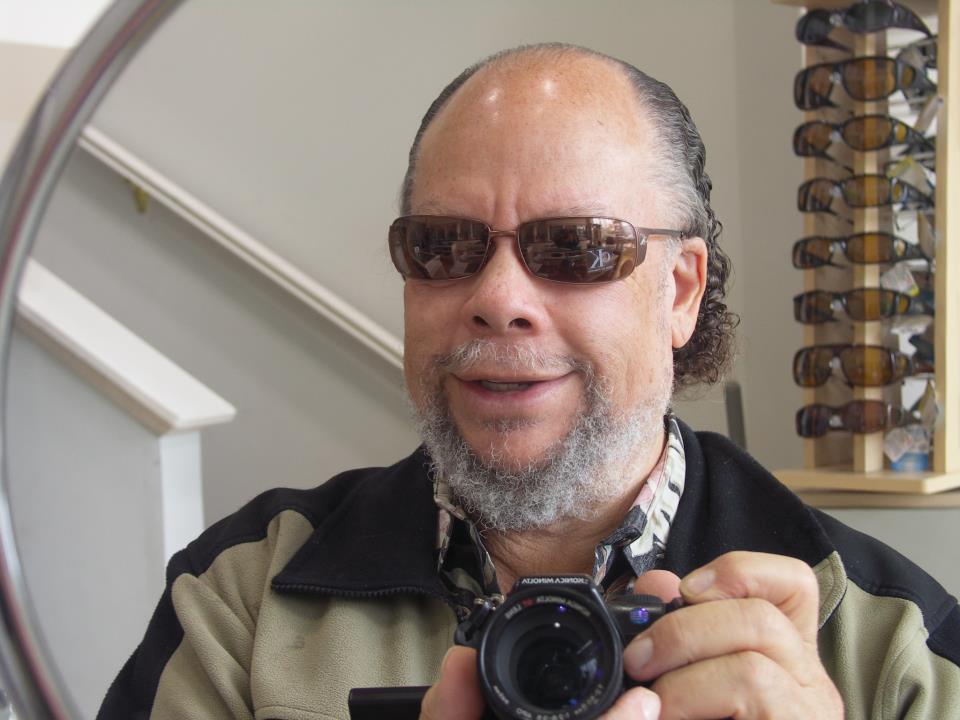 Last year, Austin Long-Scott (pictured), who reported from the Carter White House, described it this way for Journal-isms:
Last year, Austin Long-Scott (pictured), who reported from the Carter White House, described it this way for Journal-isms:
“It was supposed to be a fantastic assignment, great for my professional career, one of the high honors of journalism. I would be not just a White House Correspondent, but the second African American in that job at the increasingly prestigious Washington Post that had just exposed the Watergate scandal which toppled President Richard Nixon.
“And I would be covering peanut farmer and former Georgia Gov. Jimmy Carter, the Democrat who ended eight years of GOP Presidents in 1976. But it didn’t work out the way it was supposed to. And not just because I limped up the icy White House driveway for the first few weeks on crutches, having broken my ankle during a backyard ice hockey game with my kids while visiting friends in Ottawa.
“I used to explain why it didn’t work out by describing the job this way:
“You have a desk in a tiny cubicle in the White House press area, and you’re attached to it by a 60-foot leash, which limits how far you are allowed to go to talk to White House staff, although you do have a telephone. Projecting from the ceiling above your desk is the open end of a laundry chute. From time to time a load of dirty laundry drops out of the chute and onto your desk. Your job is to sort through the dirty laundry and deduce from that and the people willing to answer your phone calls what’s really going on in the areas your leash won’t let you reach.
“That’s not really a fair description, and I would never have put it that way if I had wanted to be a full-time political reporter. But while I liked political reporting, and covered Congress and most national political conventions, I preferred social issue reporting. Social issue reporting allowed more freedom to write compellingly about the systems that trouble so many people’s lives. . . .”
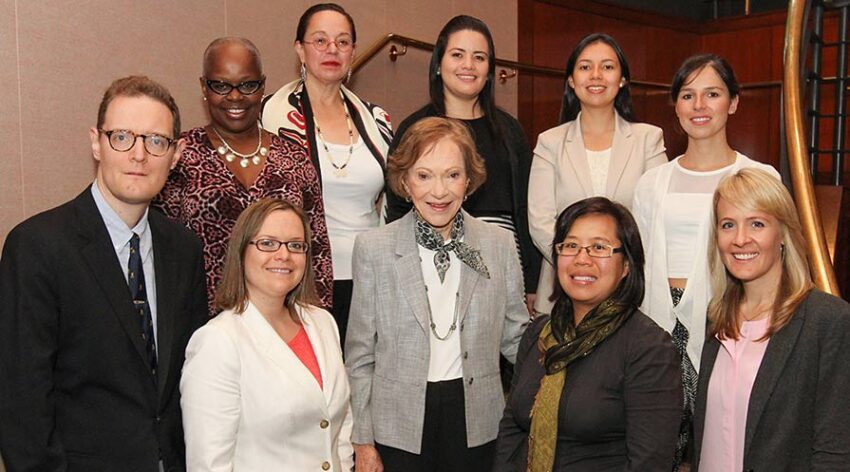
Among Carter’s legacies will be one that directly affects journalists: the Rosalynn Carter Fellowships for Mental Health Journalism.
Named for the Carter White House’s first lady, the awards seek “to develop a diverse cohort of better-informed journalists who can more effectively report on mental health and substance use across evolving and emerging platforms.” Such journalists of color as Yanick Rice Lamb, John Head, David Dent and Marissa Evans have been recipients.
“President Carter made a point of interacting with the journalism fellows at our annual meetings,” Head, a member of the 1999-2001 fellowship class, messaged Journal-isms. “In remarks and in individual conversations with us, he stressed the importance of the program’s mission. That mission included having diversity among those awarded fellowships and giving preference to projects that shined a light on the mental health needs of underserved communities. That’s why there are so many journalists of color on the fellowship roster.”
Rosalyn Carter has said, “Informed journalists can have a significant impact on public understanding of mental health issues, as they shape debate and trends with the words and pictures they convey. They influence their peers and stimulate discussion among the general public, and an informed public can reduce stigma and discrimination.”
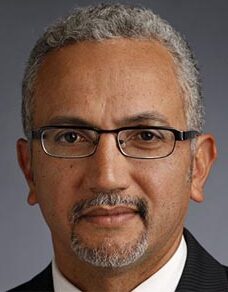 In August 2015, then-columnist James Ragland (pictured) assessed Carter for his Dallas Morning News column.
In August 2015, then-columnist James Ragland (pictured) assessed Carter for his Dallas Morning News column.
“The world could use more men like Jimmy Carter,” he began.
“Sure, his politics and presidency may not be everyone’s cup of tea. Those periodic rankings by presidential scholars typically aren’t kind to him.
“But whether you consider Carter an ‘average’ president or worse, which is where most of these lists peg Carter, you’d be hard-pressed to find fault with his personal life, or the ambitious humanitarian agenda he pursued after losing his re-election bid in 1980.
“The peanut farmer who became one of the most powerful political figures in the world still calls Rosalyn, his wife of 69 years, the best thing that ever happened to him.
“Excuse me for thinking that’s just awesome. . . .”
- Bruce Drake, Politico: Where, Oh Where, Did Candidates’ Spontaneity Go? (Jan. 31, 2007)
- Maham Javaid, Washington Post: He lost the White House in a landslide. Now Jimmy Carter is celebrated.
- Jet magazine: [Askia Muhammad Is] First Black Reporter to Q [Askia Muhammad Is] First Black Reporter to Question Carter (June 30, 1977)
- Journal-isms: A Slight Course Correction (on death of Ronald Reagan) (June 9, 2004)
More than 40 people were on the Zoom call Sunday with Rep. James Clyburn, D-S.C., and Dennis Brownlee, founder of the African American Irish Diaspora Network; 76 others watched on Facebook. (Credit: YouTube)
Clyburn Lauds Carter on Judgeships, Showing ‘How to Lose’
Jimmy Carter should be remembered as a president who showed people “not just how to win, but how to lose,” Rep. James Clyburn, D-S.C., the House assistant Democratic leader, told the Journal-isms Roundtable Sunday. Clyburn also said Carter’s record-setting appointments of federal judges of color is too often overlooked.
Carter was asked in the Zoom conversation what the former president’s legacy would be, and how we should think about Carter’s presidency and post-presidency.
Clyburn responded:
“When I wrote my memoirs, I called it, as you can see, “Blessed Experiences: Genuinely Southern, Proudly Black.“
“That name was not by accident, it was by experiences. An experience I had when I was in the governor’s office, and I heard a white legislator, after saying something that I considered to be offensive.
 “And I approached him about it. He said to me, ‘You must understand, I’m a Southerner.’
“And I approached him about it. He said to me, ‘You must understand, I’m a Southerner.’
“Well, I didn’t think that being a Southerner gives you rights to be racist, because I, too, am a Southerner, and because of my experiences I have a set of actions, just like Jimmy Carter — Jimmy Carter’s experiences growing up in Plains, Ga., in a majority-Black community.
“He came to the conclusion, upon becoming governor, that there were certain things taking place in Georgia that should not take place, especially as it related to those people that he grew up with.
“So Jimmy Carter taught us not just how to get elected, because he did a great job of that going out . . . disrupting everybody’s conventional wisdom. Winning the Iowa contest. And going on to become the Democratic nominee, and breaking a stranglehold.
“He taught us how to win.
“But when he lost, he taught us how to lose.
“And he became . . . the real public servant after having lost his re-election, a much better public servant than he was before.
“And one of those things, if you want to find out exactly the impact that he’s had, not just the work he’s done with building houses for Habitat for Humanity, going around the world, observing elections, doing what he could to make sure elections were fair.
“But look at his appointments.
“Until [President] Biden, Jimmy Carter had the record on putting people of color on the judiciary.
“Just go take a look at the record. Most people don’t know that record, but that record is clear that he put more people of color into the federal courts, into the courts of appeal.
“Everything except the United States Supreme Court. And that’s why I decided to tell Joe Biden he needed to take that step. Jimmy Carter had done all the things we had done [but] had not done the Supreme Court, and so I think Jimmy Carter is going to go down as one who showed people not just how to win, but how to lose.”
According to the Encyclopedia of African American Society, edited by Gerald D. Jaynes, “During the administrations of Richard Nixon and Gerald Ford, no blacks were named to federal appeals courts. However, under President Jimmy Carter, the number of blacks in the federal judiciary soared. Carter appointed 38 African Americans to federal judgeships in just four years, accounting for some 15 percent of all his federal court appointments. Carter was also noted for the large number of Hispanic and female judges he appointed,
‘The Carter administration represented a high-water mark for the appointment of black federal judges.”
To subscribe at no cost, please send an email to journal-isms+subscribe@groups.io and say who you are.
Facebook users: “Like” “Richard Prince’s Journal-isms” on Facebook.
Follow Richard Prince on Twitter @princeeditor
Richard Prince’s Journal-isms originates from Washington. It began in print before most of us knew what the internet was, and it would like to be referred to as a “column.” Any views expressed in the column are those of the person or organization quoted and not those of any other entity. Send tips, comments and concerns to Richard Prince at journal-isms+owner@
View previous columns (after Feb. 13, 2016).
View previous columns (before Feb. 13, 2016)
- Diversity’s Greatest Hits, 2018 (Jan. 4, 2019)
- Book Notes: Is Taking a Knee Really All That? (Dec. 20, 2018)
- Book Notes: Challenging ’45’ and Proudly Telling the Story (Dec. 18, 2018)
- Book Notes: Get Down With the Legends! (Dec. 11, 2018)
- Journalist Richard Prince w/Joe Madison (Sirius XM, April 18, 2018) (podcast)
- Richard Prince (journalist) (Wikipedia entry)
- February 2018 Podcast: Richard “Dick” Prince on the need for newsroom diversity (Gabriel Greschler, Student Press Law Center, Feb. 26, 2018)
- Diversity’s Greatest Hits, 2017 — Where Will They Take Us in the Year Ahead?
- Book Notes: Best Sellers, Uncovered Treasures, Overlooked History (Dec. 19, 2017)
- An advocate for diversity in the media is still pressing for representation, (Courtland Milloy, Washington Post, Nov. 28, 2017)
- Morgan Global Journalism Review: Journal-isms Journeys On (Aug. 31, 2017)
- Diversity’s Greatest Hits, 2016
- Book Notes: 16 Writers Dish About ‘Chelle,’ the First Lady
- Book Notes: From Coretta to Barack, and in Search of the Godfather
- Journal-isms’ Richard Prince Wants Your Ideas (FishbowlDC, Feb. 26, 2016)
- “JOURNAL-ISMS” IS LATEST TO BEAR BRUNT OF INDUSTRY’S ECONOMIC WOES (Feb. 19, 2016)
- Richard Prince with Charlayne Hunter-Gault, “PBS NewsHour,” “What stagnant diversity means for America’s newsrooms” (Dec. 15, 2015)
- Book Notes: Journalists Follow Their Passions
- Book Notes: Journalists Who Rocked Their World
- Book Notes: Hands Up! Read This!
- Book Notes: New Cosby Bio Looks Like a Best-Seller
- Journo-diversity advocate turns attention to Ezra Klein project (Erik Wemple, Washington Post, March 5, 2014)

